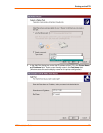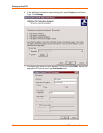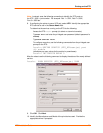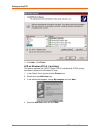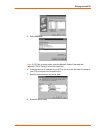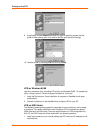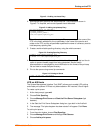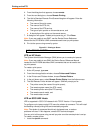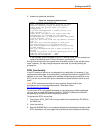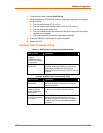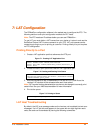
Printing on the ETS
ETS Installation Guide 35
2. Answer the questions that follow.
Figure 5-6. Configuring Remote Printer
Remote Printing Configuration
Enter information for remote printers or local
printers accepting remote printing requests
Please enter the printer name (q to quit):
backupprinter
Is printer backupprinter a remote printer or a
local printer? (r/l) r
Please enter the name of the remote host that
backupprinter is attached to: ETS_xxxxxx
The backupprinter is connected to host ETS_xxxxxx.
Is this correct? (y/n) y
Would you like this to be the sys.default printer?
(y/n) y
Make sure your hostname appears in ETS_PRT’s
/etc/hosts.equivor or /etc/hosts:lpd file.
Make sure backupprinter appears in /etc/printcap
(in BSD format).
Make sure backupprinter has a spool directory on
ETS_PRT.
Putting the printer in printer description file and
creating spool directory... done
Updating LP information... done
In the example, the printer name is your ETS service name, and the remote host
name is the name of your ETS as it is listed in your hosts file.
During initial configuration, the queue name must be the same as the remote printer
name. However, you may change the queue name later by manually editing the
printcap file.
RTEL Functionality
If the LPR method of printing is not adequate for an application (for example, if you
need banners before jobs, or more flexibility), configure the Lantronix-supplied RTEL
software on the host. After installing the software configuring the connections to the
ETS, you can use normal UNIX print commands and queue utilities such as lpc and
lpstat.
Note: RTEL binaries are provided for many systems. Source code is also
provided for use on non-supported systems. Download it from
ftp://ftp.lantronix.com/pub/rtel
.
To print to the ETS using special formatting or using third-party software packages,
you may have to create print pipes on the host. The RTEL software provides this
functionality by providing a UNIX named-pipe interface.
To recreate the RTEL source files:
1. Copy the file RTEL_SRC.TAR in binary mode from the distribution CD-ROM to
the UNIX host.
2. Untar the archive.
3. See the README files in the created directories that describe the contents of the
RTEL distribution and man pages that describe the actual software functionality.



